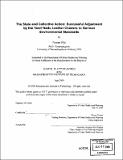| dc.contributor.advisor | Meenu Tewari. | en_US |
| dc.contributor.author | Pillai, Poonam, 1963- | en_US |
| dc.contributor.other | Massachusetts Institute of Technology. Dept. of Urban Studies and Planning. | en_US |
| dc.date.accessioned | 2012-02-29T17:26:25Z | |
| dc.date.available | 2012-02-29T17:26:25Z | |
| dc.date.copyright | 2000 | en_US |
| dc.date.issued | 2000 | en_US |
| dc.identifier.uri | http://hdl.handle.net/1721.1/69426 | |
| dc.description | Thesis (M.C.P.)--Massachusetts Institute of Technology, Dept. of Urban Studies and Planning, 2000. | en_US |
| dc.description | Includes bibliographical references (leaves 70-73). | en_US |
| dc.description.abstract | In the existing literature on industrial districts, collective action has mostly been conceptualized in terms of cooperation between firms organized as clusters. Few studies have looked at the role of the State in enabling firms to respond collectively to external pressures. In this thesis, I examine the case of the traditional, labor-intensive, predominantly small firm leather clusters of Tamil Nadu (India) to illustrate the role of the State in enabling quick, widespread and longterm compliance by the clusters to German quality standards. I argue that while joint action between firms was crucial in triggering certain kinds of government action, it alone cannot explain how compliance to the German bans was achieved and sustained. Indian central government agencies intervened in three specific ways. First, the central government's past policies, often criticized for being inefficient, had the surprising impact of compelling leading leather exporters to act collectively at the time of the German bans. Secondly, in the aftermath of the German bans, two Indian central government ministries took regulatory actions which were significantly different from the German regulations in that they banned production of chemicals (prohibited for import and sale within Germany), by targeting input suppliers and not tanners or leather exporters. Finally, a traditional supply-side central government research and development institute upgraded itself to act in a demand driven way. The focus of this thesis is to look at how the impact of these government actions played out in the context of the Tamil Nadu leather clusters and enabled them to adjust and sustain compliance. By focusing on the role of the State in helping small firms to act collectively, my thesis contributes to a neglected theme in the industrial districts literature. In addition, it throws light on two important debates in this literature, namely, (i) the conditions under which government agencies mediate crises facing industrial clusters and (ii) conditions under which small firm clusters can sustain compliance beyond the initial moments of crisis. | en_US |
| dc.description.statementofresponsibility | by Poonam Pillai. | en_US |
| dc.format.extent | 79 leaves | en_US |
| dc.language.iso | eng | en_US |
| dc.publisher | Massachusetts Institute of Technology | en_US |
| dc.rights | M.I.T. theses are protected by
copyright. They may be viewed from this source for any purpose, but
reproduction or distribution in any format is prohibited without written
permission. See provided URL for inquiries about permission. | en_US |
| dc.rights.uri | http://dspace.mit.edu/handle/1721.1/7582 | en_US |
| dc.subject | Urban Studies and Planning. | en_US |
| dc.title | The state and collective action : successful adjustment by the Tamil Nadu leather clusters to German environmental standards | en_US |
| dc.type | Thesis | en_US |
| dc.description.degree | M.C.P. | en_US |
| dc.contributor.department | Massachusetts Institute of Technology. Department of Urban Studies and Planning | |
| dc.identifier.oclc | 47917428 | en_US |
